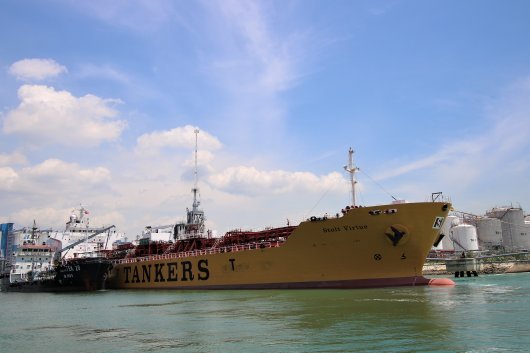MEPC adopts best practice guidance for bunker buyers
Move is designed to help assure the quality of fuel oil delivered to, and used aboard ships.
The Marine Environment Protection Committee (MEPC), at its 72nd session in London, last week adopted a best practice guidance for fuel oil purchasers/users for assuring the quality of fuel oil used on board ships.
The committee implemented measures to help assure the quality of fuel oil delivered to, and used aboard ships, with respect to both compliance with MARPOL regulations and the safe and efficient operation of ships.
The guidance also addresses the quality management systems of companies delivering, transferring, sampling and treating fuel, as well as the technical details to be included in the specification.
Earlier this month, the International Bunker Industry Association (IBIA) launched the first edition of its 'Best practice guidance for suppliers for assuring the quality of bunkers delivered to ships', which addresses procedures to safeguard and maintain bunker fuel quality control throughout the entire supply chain - from the production of bunkers all the way through to the delivery to ships.
IBIA's supply aid, which was submitted to MEPC 72, is designed to complement the guide for purchasers, help improve standards and lower the risk of fuel delivered not meeting the buyer's quality specifications.
The bunker association concedes that its guidance is "ambitious" and that "many bunker suppliers would struggle to adhere to various aspects of these best practices", but is also open to the idea of revising the document in response to feedback received from industry stakeholders.
The committee implemented measures to help assure the quality of fuel oil delivered to, and used aboard ships, with respect to both compliance with MARPOL regulations and the safe and efficient operation of ships.
The guidance also addresses the quality management systems of companies delivering, transferring, sampling and treating fuel, as well as the technical details to be included in the specification.
Earlier this month, the International Bunker Industry Association (IBIA) launched the first edition of its 'Best practice guidance for suppliers for assuring the quality of bunkers delivered to ships', which addresses procedures to safeguard and maintain bunker fuel quality control throughout the entire supply chain - from the production of bunkers all the way through to the delivery to ships.
IBIA's supply aid, which was submitted to MEPC 72, is designed to complement the guide for purchasers, help improve standards and lower the risk of fuel delivered not meeting the buyer's quality specifications.
The bunker association concedes that its guidance is "ambitious" and that "many bunker suppliers would struggle to adhere to various aspects of these best practices", but is also open to the idea of revising the document in response to feedback received from industry stakeholders.

|
Swedish biomethane bunkered in Gothenburg
Test delivery performed by St1 and St1 Biokraft, who aim to become large-scale suppliers. |
|
|
|
||

|
Cockett to be closed down after 45 years
End of an era as shareholders make decision based on 'non-core nature' of Cockett's business. |
|
|
|
||

|
Petrobras confirms prompt availability of VLS B24 at Rio Grande
Lead time for barge deliveries currently five days. |
|
|
|
||

|
IMO approves pricing mechanism based on GHG intensity thresholds
Charges to be levied on ships that do not meet yearly GHG fuel intensity reduction targets. |
|
|
|
||

|
VARO Energy expands renewable portfolio with Preem acquisition
All-cash transaction expected to complete in the latter half of 2025. |
|
|
|
||

|
NYK trials biofuel in milestone coal carrier test
Vessel is used to test biofuel for domestic utility company. |
|
|
|
||

|
H-Line Shipping orders LNG bunkering vessel
Vessel with 18,000-cbm capacity to run on both LNG and MDO. |
|
|
|
||

|
How to engineer and manage green shipping fuels | Stanley George, VPS
Effective management strategies and insights for evolving fuel use. |
|
|
|
||

|
Swedish government bans scrubber wastewater discharges
Discharges from open-loop scrubbers to be prohibited in Swedish waters from July 2025. |
|
|
|
||

|
MAN Energy Solutions achieves 100% load milestone for ammonia engine
Latest tests validate fuel injection system throughout the entire load curve. |
|
|
|
||
Related Links
- · IBIA presents best practice guidance for suppliers [Insights]
- · Global sulphur levels for residual fuels rose to six-year high in 2017: MEPC [Insights]
- · PPR6 to develop Arctic HFO ban as nations urge 2021 implementation [Insights]
- · IMO agrees historic deal to cut carbon in shipping sector [Insights]

